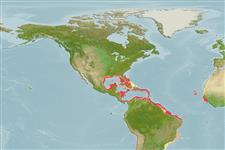Environment: milieu / climate zone / depth range / distribution range
Sinh thái học
Biển Cùng sống ở rạn san hô; không di cư; Mức độ sâu 3 - 100 m (Ref. 7379). Subtropical; 33°N - 30°S, 99°W - 14°W
Western Atlantic: Florida, USA and Bahamas to Brazil, including the Gulf of Mexico and the Caribbean (Ref. 26938). Eastern Atlantic: off Ascension Island (Ref. 7379) and St. Paul's Rocks (Ref. 13121).
Length at first maturity / Bộ gần gũi / Khối lượng (Trọng lượng) / Age
Maturity: Lm 23.3, range 15 - 25 cm
Max length : 41.1 cm TL con đực/không giới tính; (Ref. 9626); common length : 28.0 cm TL con đực/không giới tính; (Ref. 3797); Tuổi cực đại được báo cáo: 27 các năm (Ref. 118244)
Các tia vây lưng cứng (tổng cộng) : 10; Các vây lưng mềm (tổng cộng) : 29 - 31; Tia cứng vây hậu môn: 3; Tia mềm vây hậu môn: 22 - 24. Black, the scales of the body , except those at front from nape to abdomen, rimmed with golden yellow; a broad orange-yellow bar at pectoral absent; dorsal filament yellow; chin whitish; outer part of iris yellow; eye narrowly rimmed below with blue (Ref. 13442)
Common in shallow reefs. Usually in pairs, often near sea fans (Ref. 9710). Feed on sponges, algae, bryozoans, zoantharians, gorgonians and tunicates (Ref. 9626). Oviparous (Ref. 240), monogamous (Ref. 52884). Spawning pairs are strongly territorial, with usually both members vigorously defending their areas against neighboring pairs (Ref. 38726). Juveniles tend cleaning stations where they service a broad range of clients, including jacks, snappers, morays, grunts, surgeonfishes, and wrasses. At the station the cleaner displays a fluttering swimming and when cleaning it touches the clients with its pelvic fins (Ref. 40094). Flesh considered good quality; marketed fresh (Ref. 3797). Has been reared in captivity (Ref. 35419).
Life cycle and mating behavior
Maturities | Sự tái sinh sản | Spawnings | Egg(s) | Fecundities | Ấu trùng
This species manifests apparent permanent pairing and monogamy. During most of the observation period, a single pair swam slowly in a side-to-side orientation at a height of 25 to 75 cm above the reef. No conspicuous courtship displays were evident, nor was there any evidence of sexual identity, i.e., the female was not obviously swollen with eggs. Shortly after sunset, the pair ascended in a broad, shallow arc off the bottom, traversing approximately 7 to 10 m while ascending to a height of 2 to 3 m. As the pair ascended, each angled its body slightly, with their venters in close proximity, if not actually touching. This position was held throughout the peak of the arc, with the pair diverging on the descent. Other pairs in the area were seen making similar arcing movements elsewhere on the reef at approximately the same time. It was difficult to see if there were gametes released in the event. There was no interference between pairs during spawning. Monogamous mating is observed as both obligate and social (Ref. 52884).
Allen, G.R., 1985. Butterfly and angelfishes of the world. Vol. 2. 3rd edit. in English. Mergus Publishers, Melle, Germany. (Ref. 4858)
IUCN Red List Status (Ref. 130435)
Threat to humans
Reports of ciguatera poisoning (Ref. 30303)
Human uses
Các nghề cá: buôn bán nhỏ; Bể nuôi cá: Tính thương mại
Các công cụ
Special reports
Download XML
Các nguồn internet
Estimates based on models
Preferred temperature (Ref.
123201): 22.9 - 28, mean 26.6 °C (based on 410 cells).
Phylogenetic diversity index (Ref.
82804): PD
50 = 0.5001 [Uniqueness, from 0.5 = low to 2.0 = high].
Bayesian length-weight: a=0.03890 (0.02164 - 0.06995), b=2.91 (2.76 - 3.06), in cm total length, based on LWR estimates for this species & Genus-body shape (Ref.
93245).
Mức dinh dưỡng (Ref.
69278): 2.8 ±0.0 se; based on diet studies.
Generation time: 9.2 ( na - na) years. Estimated as median ln(3)/K based on 2
growth studies.
Thích nghi nhanh (Ref.
120179): Trung bình, thời gian nhân đôi của chủng quần tối thiểu là 1.4 - 4.4 năm (K=0.21).
Fishing Vulnerability (Ref.
59153): Moderate vulnerability (39 of 100).
Nutrients (Ref.
124155): Calcium = 27.3 [12.3, 50.1] mg/100g; Iron = 0.534 [0.310, 0.915] mg/100g; Protein = 19.1 [17.9, 20.2] %; Omega3 = 0.157 [0.092, 0.269] g/100g; Selenium = 19.1 [9.3, 37.8] μg/100g; VitaminA = 30.8 [7.5, 115.5] μg/100g; Zinc = 0.777 [0.506, 1.173] mg/100g (wet weight);
